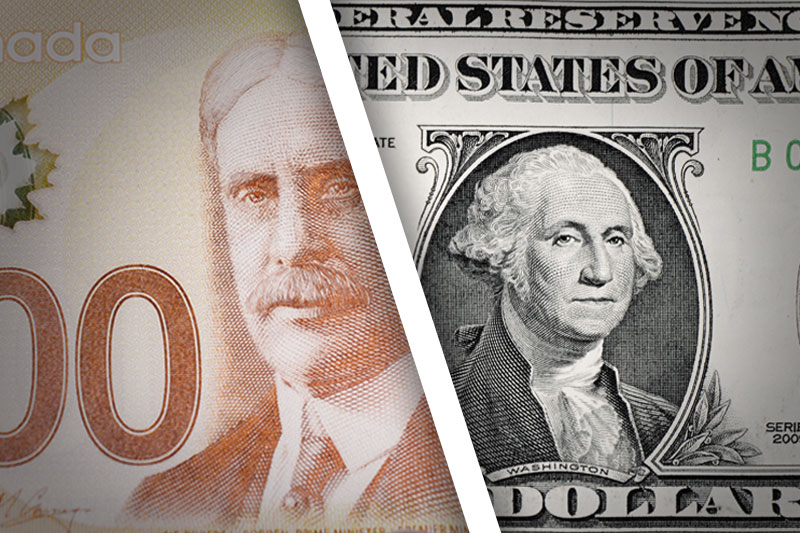Investing.com - The U.S. dollar slid lower against its Canadian counterpart on Tuesday, as a string of U.S. data added to concerns over the strength of the country's economic recovery, weighing on demand for the greenback.
USD/CAD hit 1.0206 during European afternoon trade, the session low; the pair subsequently consolidated at 1.0211, shedding 0.40%.
The pair was likely to find support at 1.0134, Monday's low and resistance at 1.0265, the high of March 22.
In a report, the Census Bureau said U.S. building permits rose by 0.902 million in March, less than the expected 0.940 million increase, after a 0.968 million rise the previous month.
The report added that housing starts in the U.S. rose by 1.036 million units last month, beating expectations for an increase of 0.930 million, after a 0.986 million rise in February.
Separately, official data showed that core consumer price inflation in the U.S. rose 0.1% in March, disappointing expectations for a 0.2% increase, after a 0.2% rise the previous month.
Consumer price inflation, including food and energy, fell 0.2% last month after a 0.7% rise in February, compared to expectations for a 0.1% gain.
In Canada, official data showed that manufacturing sales rose 2.60% in February, beating expectations for a 1% increase, after a 0.60% decline the previous month.
A separate report showed that foreign security purchases in Canada fell by CAD6.31 billion in February, after a CAD14.32 billion increase the previous month, compared to expectatons for a CAD7.28 billion rise.
The loonie was almost unchanged against the euro with EUR/CAD inching up 0.02%, to hit 1.3367.
Also Tuesday, the German ZEW economic sentiment index dropped to 36.3 in April, from a reading of 48.5 the previous month, compared to expectations for a fall to 42.0.
The euro zone ZEW economic sentiment index declined to 24.9 this month, from 33.4, compared to expectations for a reading of 31.5.
A separate report showed that euro zone CPI remained unchanged at an annualized rate of 1.7% in March, in line with expectations, while core CPI rose to an annualized rate of 1.5% last month, from 1.3% in February, beating expectations for a rise to 1.4%.
USD/CAD hit 1.0206 during European afternoon trade, the session low; the pair subsequently consolidated at 1.0211, shedding 0.40%.
The pair was likely to find support at 1.0134, Monday's low and resistance at 1.0265, the high of March 22.
In a report, the Census Bureau said U.S. building permits rose by 0.902 million in March, less than the expected 0.940 million increase, after a 0.968 million rise the previous month.
The report added that housing starts in the U.S. rose by 1.036 million units last month, beating expectations for an increase of 0.930 million, after a 0.986 million rise in February.
Separately, official data showed that core consumer price inflation in the U.S. rose 0.1% in March, disappointing expectations for a 0.2% increase, after a 0.2% rise the previous month.
Consumer price inflation, including food and energy, fell 0.2% last month after a 0.7% rise in February, compared to expectations for a 0.1% gain.
In Canada, official data showed that manufacturing sales rose 2.60% in February, beating expectations for a 1% increase, after a 0.60% decline the previous month.
A separate report showed that foreign security purchases in Canada fell by CAD6.31 billion in February, after a CAD14.32 billion increase the previous month, compared to expectatons for a CAD7.28 billion rise.
The loonie was almost unchanged against the euro with EUR/CAD inching up 0.02%, to hit 1.3367.
Also Tuesday, the German ZEW economic sentiment index dropped to 36.3 in April, from a reading of 48.5 the previous month, compared to expectations for a fall to 42.0.
The euro zone ZEW economic sentiment index declined to 24.9 this month, from 33.4, compared to expectations for a reading of 31.5.
A separate report showed that euro zone CPI remained unchanged at an annualized rate of 1.7% in March, in line with expectations, while core CPI rose to an annualized rate of 1.5% last month, from 1.3% in February, beating expectations for a rise to 1.4%.
